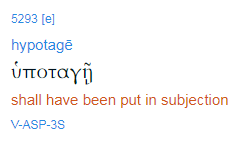
This is part of a series on patriarchy, headship, and submission. See this index.
When I wrote “The Context of Genesis 3:16”, I looked at how the context of Genesis 3:16 could be combined with that of Ephesians 5 and 1 Peter 3. Regarding the submission in Ephesians 5, I had this to say:
The idea that wives submit to their husbands in a strict hierarchical, unidirectional, non-mutual authority structure might make some sense in a tightly selected context—a sentence fragment—but that flies in the face of what Paul was actually saying and how he was saying it. The verb “be submitting” in elided in v22. It isn’t actually there, rather its presence is implied from v21 before it. The submitting in v21 is the same as v22. Interpreting the latter without concern for the former is poor exegesis, when the most logical and simplest explanation is that v22 is an example of v21. Moreover, the participle “be submitting” is in the middle voice, implying that the person submitting is doing so of their free will, not an act of force, command, or authority. The emphasis of Ephesians 5 is inward focused (e.g. choice), not outward focused (e.g. authority).
In English we generally do not talk about active, middle, or passive voices. We can’t trivially conjugate our verbs so that the listener more-or-less automatically knows the sense of what we are saying by the verbs alone. Let me demonstrate how difficult it is to translate Greek verbs (including their voice) into English:

Here 6 English words are needed to fully convey the meaning of this single Greek verb. Because Bible translators are rarely this verbose, this makes correctly capturing the sense that much more difficult, and is often poorly done. This simplification leads to all sorts of doctrinal errors. Don’t believe me? Consider this:

The English translates this as…
[whatever] you bind on earth will be bound
…instead of…
[whatever] you shall bind on earth shall have [already] been bound
The former permits the Petrine apostolic succession of Roman Catholicism while the more verbose latter does not. This is important!
Now, let’s consider how the Greek word for submission (hypotassō) can carry a variety of senses and have very different meanings according to its ‘voice’:
active — to subject another.
middle — to submit oneself.
passive — to be subjected upon.
Many people interpret the submission mentioned in Ephesians 5 as if it were of the active/passive variety, rather than the middle. In order to illustrate this, we will compare and contrast how Paul uses the word in these three words to show that Paul was not referring to authority in Ephesians 5 and that native speakers understood this intuitively by the way the words were used.
Paul uses the word “submit” three times in Ephesians 5, but just once in Ephesians 5:22-24, the major point of contention. Indeed, he elides the verb to relatively de-emphasize it. By contrast, he emphasizes the word “love” a total of six times in his instructions to husbands. He uses the head-body metaphor of unity, once referring to head and thrice to the body. The context of that submission is for all believers to submit to each other (see v21). The word “submit” is used in the middle voice.
Now let’s go over to 1 Corinthians 15:27-28:
For he “has put [hypotassō] everything under his feet.” Now when it says that “everything” has been put [hypotassō] under him, it is clear that this does not include God himself, who put [hypotassō] everything under Christ. When he has done [hypotassō] this, then the Son himself will be made subject [hypotassō] to him who put [hypotassō] everything under him, so that God may be all in all.
The difference between Corinthians and Ephesians is quite striking! In Ephesians, Paul elides the verb, minimizing how many times he uses the word submit and avoiding using it directly to wives, but this restraint is completely absent here. Paul uses submit six times in two verses. Unlike the passive verb form in Ephesians, in Corinthians Paul uses the active (‘subjecting’) and passive (‘being subjected’) forms while pairing this, not with the unity-based head-body metaphor of Ephesians, but with a subordination-based head-foot metaphor.
It is interesting to note how the translators partially elided the word submit in 1 Corinthians 15:27-28, going with “has put” “has done”, and “who put” instead. Meanwhile, the same translators inserted the elided verb into Ephesians 5:21-22 and split the sentence into two paragraphs. These alterations clearly change the emphasis of the submission from that found in the originals.
Anyone who suggests that Paul is speaking of a subordination or authority in Ephesians 5 is missing the fact that Paul didn’t use the right language if that is what he intended. English translations serve to hide what was clear to native speakers. To illustrate this fact, as I did here, we turn to John Chrysostom, who wrote on Ephesians 5 in the late 4th century.
Chrysostom wrote that the “washing in the Word” was baptism into the church by the name of the Father, Son, and Holy Spirit (i.e. Matthew 28:19), whereby the uncleanness of its members was washed away. Chrysostom then wrote that because a husband’s bride is defective, he should not to seek from his wife that which she does not possess, but rather to seek for themselves the spiritual adornment that Christ placed on his bride. In other words, he reads in v.25-26 a command that husbands are to personally seek the spiritual glorification that the church received in the washing by the word. To love their wives, husbands must be washed in the word not do the washing! He says…
“Let us wipe off the spot that is within, let us smooth the wrinkles that are within, let us do away the blemishes that are on the soul.”
…as opposed to demanding in our wives spotlessness, wrinkle-free beauty, or lack of physical blemishes.
Paul’s commands to husbands are inward focused, as I pointed out in “The Context of Genesis 3:16” (quoted above):
“The emphasis of Ephesians 5 is inward focused (e.g. choice), not outward focused (e.g. authority).”
This is plain not just from context, but from Paul’s used of the passive voice and his avoidance of the active form. We can see from Corinthians that when Paul wanted to be explicit in discussing subordination, he was not shy in doing so.
John Chrysostom—a native speaker of Greek—didn’t make the same mistakes that modern English speakers make. He didn’t read Ephesians 5 and think “husbands must wash their wives in the word of God by being their spiritual leader.” Why not? Because the that isn’t what Paul was instructing!
This is why, in his commentary on the book of 1 Corinthians, he made this point:
For had Paul meant to speak of rule and subjection, as you say, he would not have brought forward the instance of a wife, but rather of a slave and a master. For what if the wife be under subjection to us? It is as a wife, as free, as equal in honor. — John Chrysostom, Homily 26, 1 Corinthians 11:3
Chrysostom, well aware of Ephesians 5, did not view the submission of a wife to her husband as one of rule and subjection. This was completely plain to him.

Pingback: Christian Discernment
Pingback: The Structure of Ephesians 5
Pingback: Mutual Submission